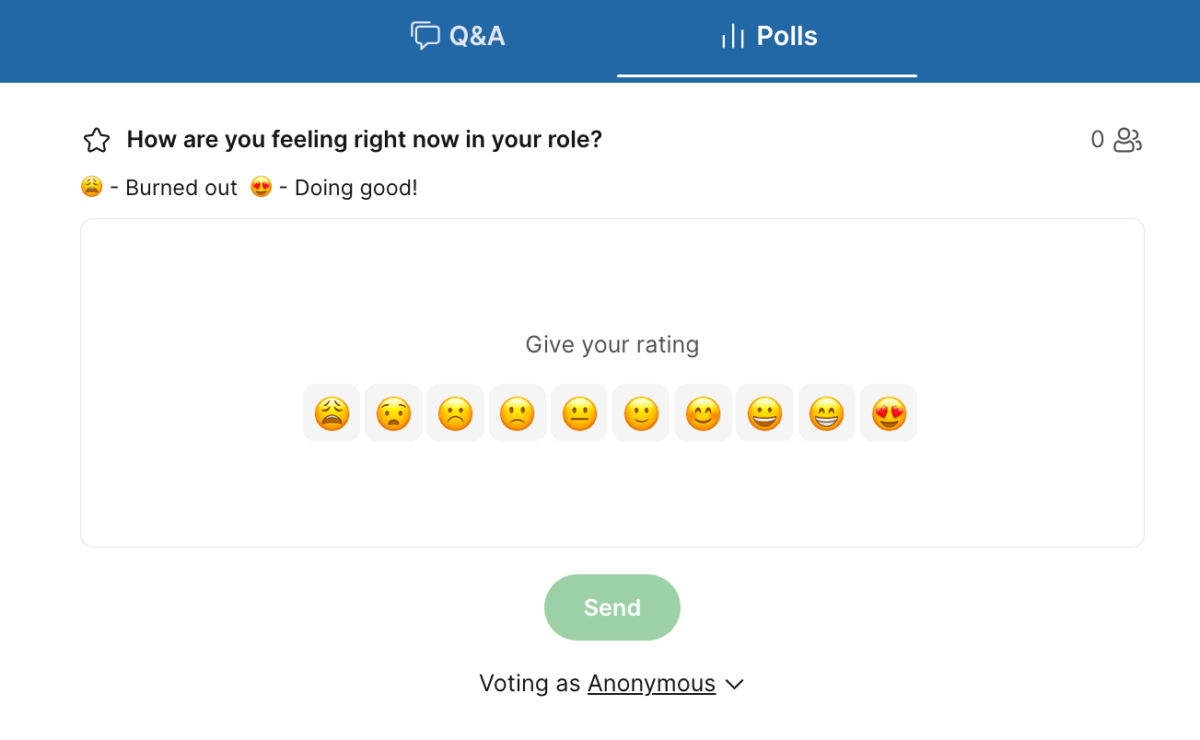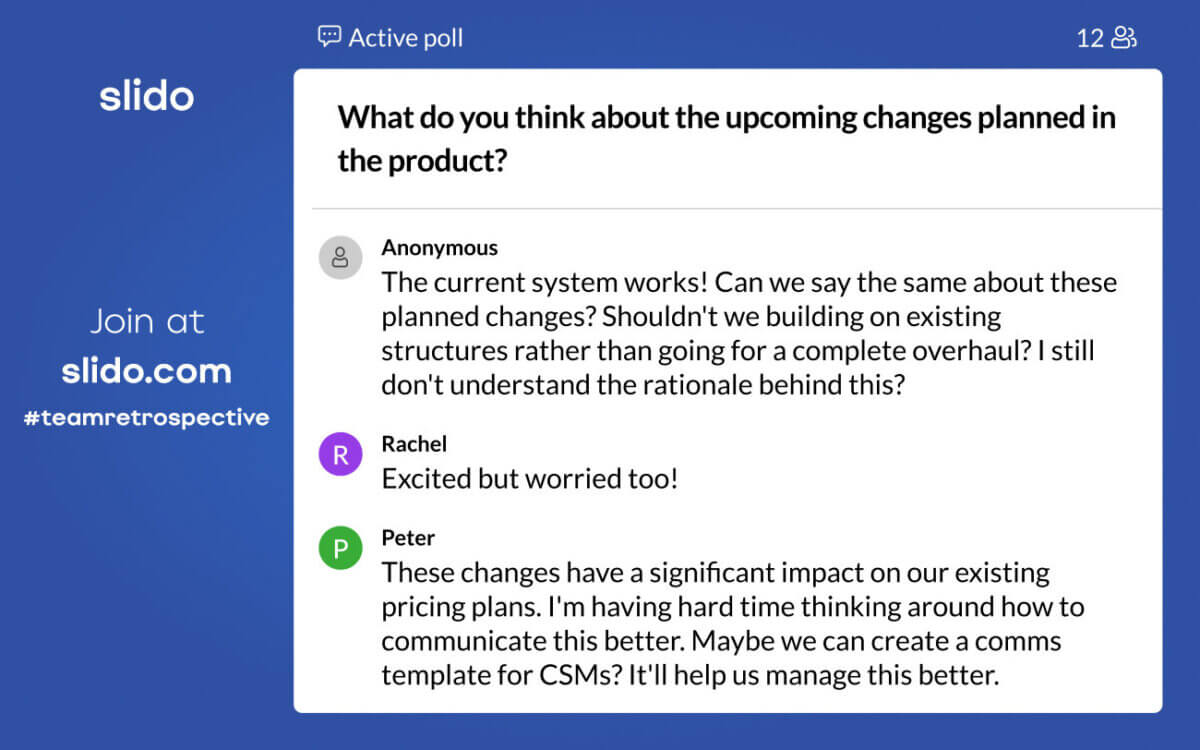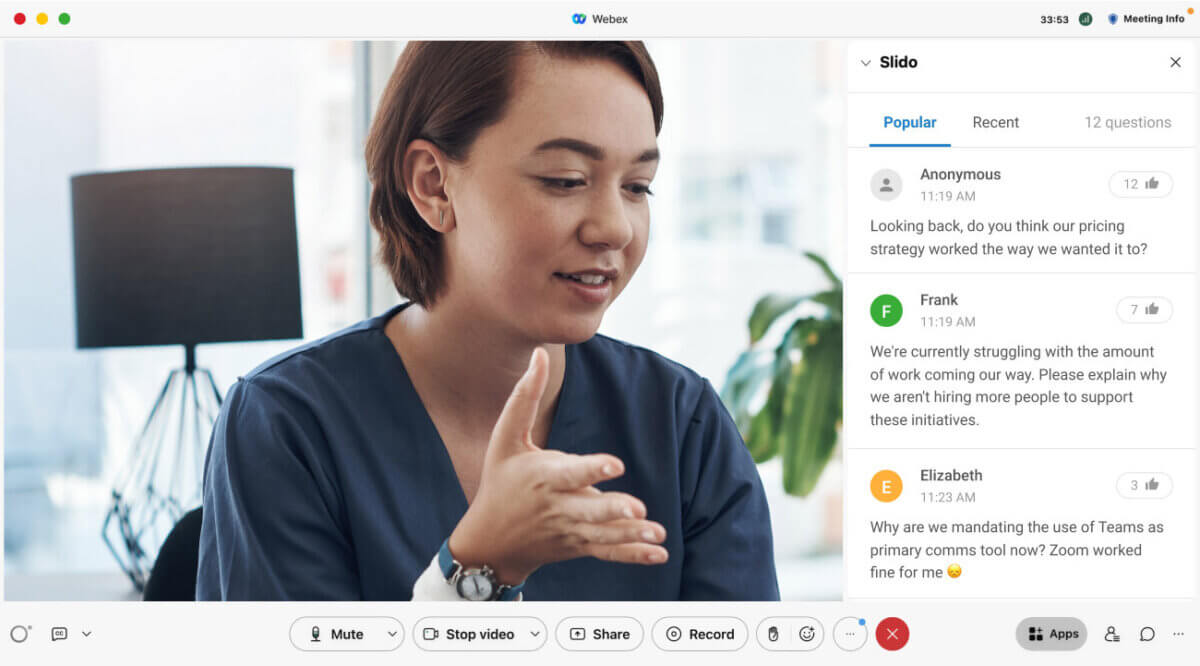At Slido, we believe in the power of anonymity. When used well, anonymous feedback can be a powerful tool for building trust between leaders and employees during meetings.
However, we’ve heard time and time again the challenges anonymity can open up. As we’ve grown, we’ve even experienced them ourselves. Despite this double-edged sword, anonymity remains a core and fundamental part of our product.
Why? We believe that anonymity can shine a spotlight on challenges, problems, and obstacles towards your success as a company, as a function, and as a team, and resolve them by collecting feedback at scale.
As with any tool, you just need to learn how to master it. Want to know how? Read on.
Four reasons to embrace anonymous feedback
During meetings, not everyone has the confidence or even the opportunity to speak up. Slido was born from this simple observation.
Our CEO Peter Komorník says:
“People are often not sure if their question is good or relevant. So they hesitate whether to ask it at all. Anonymity allows them to send it despite any uncertainty they might have and let the others decide which questions are the most relevant.”
Slido’s 2021 Trend Report found that 42% of people have left a meeting without saying what was on their mind. The Microsoft Work Trend Index 2022 shows that 54% of managers say that leadership is out of touch with their employees, and a whopping 74% don’t feel like they have the influence or resources to enact a change for employees.
Within our clients, we see that meeting participant behavior changes when anonymity is switched off or participants are named by default. We see that:
- There’s an immediate drop in the number of questions
- Fewer ideas are shared
- Critical feedback is not shared or shared in lesser quantities
- Participation in surveys goes down

Why anonymous feedback is important in building trust
The working world has changed. A multigenerational workforce, combined with the pandemic and rapid growth of hybrid work has brought on a certain shift in power at the workplace.
From the great resignation to quiet quitting, every trend we have seen in the past couple of years has been pointing at this changing power structure. The bottom line is simple, employees increasingly want to have a say in how business happens.
While anonymity is not a miracle solution here, it can serve as an equalizer and establish a middle ground between leaders and employees to facilitate these conversations. In such scenarios, anonymity becomes a tool to identify and resolve larger organizational challenges before they become a bigger problem.
“As a management team, you can never be 100% sure that you understand all the questions your employees might have. If you fail to address some of these questions before they become critical, then they become rumors. And rumors do not let you have the chance to get ahead of them and explain what needs to be explained or even provide context.”
Maximilien Notter, the Co-CEO of HUMANOO

Is trust in leadership guaranteed by default?
Working with various leaders as a Customer Success Manager, I personally have observed a general trend where leaders expect employees to speak up freely whenever asked.
One of them even told me “I am the head of the team, they should trust me by default”. It’s easy to understand why that belief might be there.
Rachel Botsman, internationally renowned author of Who Can You Trust?, summarized the modern leader-employee relationship paradigm nicely in her podcast appearance with Culture Amp, where they discussed ‘Rethinking trust at work’:
“...when people talk about building more trust, there’s a few issues with it that we need to challenge. The first thing is the idea of building means you think you are in control of this mysterious trust process. In any situation, there is a trust giver and there is a trust receiver, and it’s the trust giver that decides whether to give you their trust and your role is to earn it. So, when we talk about building trust, we are assuming that we are in control of that dynamic, but the giver is actually the one with the power.”
Bringing this back to anonymity, this trust giver-trust receiver relationship is difficult to do:
A) at scale
B) without any form of social proof that would serve as justification for giving that trust
It’s already tough at the manager level, but at the senior leadership level, where decisions are made that impact the whole company and its people, trust is vital. We can’t assume that trust, at this level, is easily given or that it is maintained. It needs to be continually earned.
How Slido is helping clients through anonymity
“We definitely received more questions because it was easy and you didn’t have to attach your name to it. The anonymity provides a real level of honesty…The collected questions revealed unexpected knowledge gaps within the leadership. It was an eye-opener. We needed to figure out how to improve our communication channels outside of leadership meetings.”
Jessica Kosmack, Senior Communications Specialist at Toronto Transit Commission.
The significance of Jessica’s story is not about the quantity of inputs from the company. The questions that came up in their Q&A allowed them to identify initiatives that can address those knowledge gaps.
By acknowledging the anonymous feedback from employees and taking action, Jessica’s organization provided both social proof and earned the trust of their employees.

Dealing with anonymity head-on, constructively, and demonstrating the vulnerability required to build intimacy, Jessica and her leadership team were able to build psychological safety and a high-trust work environment by extension.
This, done consistently over time, will bridge the gap between employees and the leaders, or between participants and the meeting facilitators. Here we see the meeting and organizational culture starting to evolve.
The expression of new ideas, openness to feedback, inclusion of those who would not normally contribute, increases diversity of thought, collaboration over command, and empowers employees to bring forth issues that are hard to raise thus fostering transparency throughout the organization.
Four tips to successfully facilitate anonymous feedback
As a leader facing anonymity, a lot of trust has to be placed in others, which may not always pan out as you intend. Over the years that I worked with our customers, all manner of toxic questions and inappropriate suggestions have been sent through Slido.
It happens. It is important to remember that this is a journey. Keep your eyes on the larger, more worthwhile aim: fostering a culture of trust.
#1. Clarify the expectations and rules for submitting to Slido, every time
Setting a clear standard of expected, professional behavior is critical. It’s best practice to state at the beginning of a meeting or event that anonymous questions are allowed, any rude or inappropriate inputs will be dismissed and remain unanswered. Create a small script that outlines this every time. Mastery comes through repetition.
#2. Avoid ‘knee-jerk’ reactions
If you receive inappropriate inputs, don’t panic, stay calm and reiterate that these are not in keeping with the spirit of the discussion. The worst thing you can do in this situation is ban anonymity or remove the option to engage with the audience entirely. This will damage progress towards breaking down the barriers in the leader-employee relationship.
#3. Use moderation to preview questions
Make sure to explain why you use moderation and what principles people should adhere to. You can also reply as an admin to explain why you rejected a question or ask people to rephrase their questions. Caution is advised though. Over-moderating makes people feel censored which erodes trust.
#4. Address the tough questions
Even if the answer is not perfect, your employees will appreciate your transparency. Difficult questions provide an opportunity to provide valuable context around company decisions. If you cannot or don’t know how to respond to a question, say so. There is no shame in it and your team will respect your honesty more than fluff.
Over to you!
The best way to understand the power of anonymity is to test it yourself. Next time you find an opportunity to do so, host an anonymous Q&A. Compare the audience engagement score with a named by default Q&A session. You’ll be surprised by the results!




